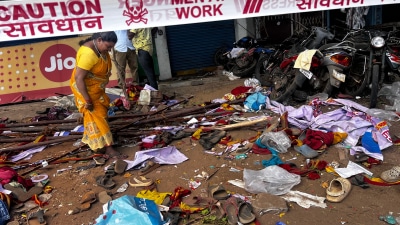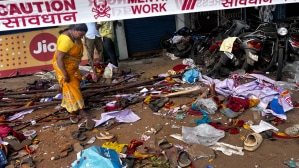Civil engineers have a special role
VADODARA, Nov 15: Stating that infrastructure was one of the major impediments to India's evolution as a globally competitive economy, Minis...

VADODARA, Nov 15: Stating that infrastructure was one of the major impediments to India’s evolution as a globally competitive economy, Minister for Narmada and Major Irrigation Projects Jaynarayan Vyas on Sunday said civil engineers had a pivotal role to play in infrastructure development projects.
Delivering the key-note address on `Role of Civil Engineering in Infrastructure Development’ at the inauguration of the M S University Engineering Alumni Association, Vyas said, “Infrastructure is a basic skeleton of any economy…and (sic) the basic aim of civil engineering is to build durable, safe and economic structures which are basic inputs in any growth proces”.
Despite adopting the “mantra of globalisation” in the early 1990s, India’s world trade share today stood at a mere 0.8 per cent, against 2.5 per cent at the time of independence, Vyas said, adding, “We have a long way to go to make our economy globally competitive”.
Vyas said that considerable inadequacies of major infrastructure — including power, roads, water, telecommunications and housing — affected the global competitiveness of Indian goods and services. The per capita consumption of power in India was just 300 KWH, compared to the whopping 18,117 KWH of Canada, 16,655 KWH of Sweden and 12,160 of the USA, he said.
“China has added more MW to its power generation between 1990 and 1995 than our total generating capacity in the past 50 years. Yet, there exists no overall policy on how the energy bank of Gujarat or the country, for that matter, should operate,” he said.
According to Vyas, the Sardar Sarovar Project was essential for the State since the environment was damaged far more by the fact that 40 per cent of the power produced in the State helped the agriculture sector draw up precious ground water.
The country’s 34,600 km-national highway network constituted less than two per cent of the country’s total road length but carried 40 per cent of the total road traffic. “At the rate at which Gujarat is growing, a massive privately funded road construction exercise is essential, since only three per cent of the State government budget is devoted to roads”, he said.
Water harnessing and management, according to Vyas, would be the greatest challenge posed to civil engineers of the future. “The planning commission’s study reveals that the number of no-source villages has climbed to 65,000 in 1996 primarily because of contamination of resources, drying up of sources and system breakdowns,” he said.
Among the other needs of the hour were a greater capacity of telecom lines and adequate housing facilities, the minister said, adding that civil engineers could play a definite role in building of infrastructure by ensuring reduction in capital investment, high returns in a shortened gestation period and quality control.
“What is required on their part is efficient planning, appropriate technology, mechanisation using modern technology and equipment and effective work management. We are living in an era of information explosion. So, tomorrow’s civil engineer will not have to be a manager but a supervisor as well. In the years to come, the success of a civil engineer will depend upon how he interacts with other faculties,” Vyas said.






- 01
- 02
- 03
- 04
- 05

























